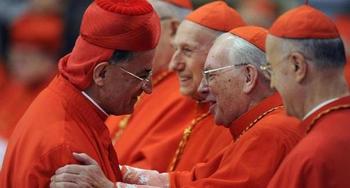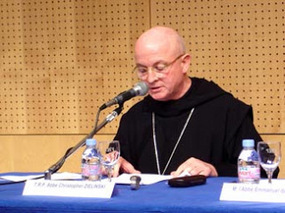 The Pope appointed Benedictine Abbot Christopher Michael John Zielinski to the be the Head of the Office (office manager) of the Congregation for Divine Worship and the Discipline of the Sacraments on Saturday, 24 November 2012. He is the number 3 person in the Congregation serving with Antonio Cardinal Cañizares, Archbishop Arthur Roche and Father Anthony Ward, SM.
The Pope appointed Benedictine Abbot Christopher Michael John Zielinski to the be the Head of the Office (office manager) of the Congregation for Divine Worship and the Discipline of the Sacraments on Saturday, 24 November 2012. He is the number 3 person in the Congregation serving with Antonio Cardinal Cañizares, Archbishop Arthur Roche and Father Anthony Ward, SM.
The “man from the Veneto” who was John Paul I
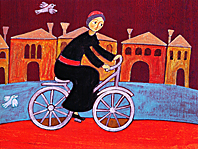 Many of us only know the name Albino Luciani. He was the one who became Pope John Paul I in 1978 and lived only 33 days as the Supreme Pontiff. That was 34 years ago; I was only 9 when the smiling pope appeared and then departed. I often think of what the face of the Church would’ve been like had he lived longer.
Many of us only know the name Albino Luciani. He was the one who became Pope John Paul I in 1978 and lived only 33 days as the Supreme Pontiff. That was 34 years ago; I was only 9 when the smiling pope appeared and then departed. I often think of what the face of the Church would’ve been like had he lived longer.
Dorothy Day not the patron saint of the “left” nor an agenda item of the “right”
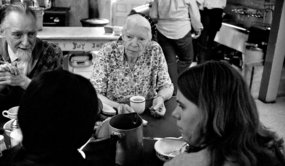 Dorothy Day is not a pawn in political camps. She is the darling of a political camp for either the seculars or the ecclesials. To apply political monikers of liberal and conservative, left or right is grossly inaccurate and a rather reductionistic manner to understand a person and her vocation, the vocation defined by love and happiness. True to an authentic follower of Christ, Dorothy Day’s vocation was to be a saint, that is singularly focussed on her Lord and Savior; her vocation was to adore and follow Jesus Christ. Day’s vocation was not to feed the the poor and argue for a change in governmental policy. As a friend said, Day’s life is too easily “framed in political terms by people who anachronistically use words like ‘liberal’ and ‘conservative’ to describe a life that was never about that fight.” Additionally, I fully agree with Martha Hennessy, 57, the granddaughter of Day who said she was uncomfortable about her grandmother’s abortion. Let’s pay attention to Martha Hennessy, “I wish we would focus on the birth of her child more than on her abortion because that’s what really played a role in her conversion.” Indeed. This is the pro-life position of the Church.
Dorothy Day is not a pawn in political camps. She is the darling of a political camp for either the seculars or the ecclesials. To apply political monikers of liberal and conservative, left or right is grossly inaccurate and a rather reductionistic manner to understand a person and her vocation, the vocation defined by love and happiness. True to an authentic follower of Christ, Dorothy Day’s vocation was to be a saint, that is singularly focussed on her Lord and Savior; her vocation was to adore and follow Jesus Christ. Day’s vocation was not to feed the the poor and argue for a change in governmental policy. As a friend said, Day’s life is too easily “framed in political terms by people who anachronistically use words like ‘liberal’ and ‘conservative’ to describe a life that was never about that fight.” Additionally, I fully agree with Martha Hennessy, 57, the granddaughter of Day who said she was uncomfortable about her grandmother’s abortion. Let’s pay attention to Martha Hennessy, “I wish we would focus on the birth of her child more than on her abortion because that’s what really played a role in her conversion.” Indeed. This is the pro-life position of the Church.
Feast of the Miraculous Medal
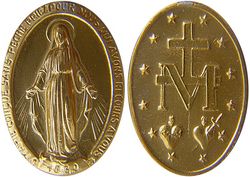 The feast of the Miraculous Medal may be surprising to a few. Catholics honor buildings, theological ideas, people and medals. The Miraculous Medal is known as the Medal of the Immaculate Conception, the medal that Our Lady on this date in 1830 instructed Saint Catherine Labouré to have struck. There is nothing miraculous about the medal. What is miraculous is the fact that it is a sign that God does miraculous things in our lives. In a boring world there are events that turn reality on end.
The feast of the Miraculous Medal may be surprising to a few. Catholics honor buildings, theological ideas, people and medals. The Miraculous Medal is known as the Medal of the Immaculate Conception, the medal that Our Lady on this date in 1830 instructed Saint Catherine Labouré to have struck. There is nothing miraculous about the medal. What is miraculous is the fact that it is a sign that God does miraculous things in our lives. In a boring world there are events that turn reality on end.
Schools of Theology: A 2012 Review
First Things editor RR Reno published his “A 2012 Ranking of Graduate Programs in Theology” yesterday, the annual romp through what’s out there for theological formation. A somewhat helpful review but it doesn’t really cover some important data. Nevertheless, it is good to see a review that advances a good perspective. What is that perspective? In my humble opinion: that in all things God may be glorified AND thinking with the Church.
- The five areas a good school of theology needs to be attentive to: sacred Scripture, sacred Liturgy, patristic study, dogmatic study and ethics. I fully believe that Prosper of Aquataine is correct, and ought to orient all study of theology: legem credendi lex statuat supplicandi. In shorthand, the law of prayer is the law of belief.
The end times are indeed near at hand…
The end times are indeed near at hand. That is not to say that the “12/12/2012” Mayan prediction of the end of the world is true –it is not– or that the rapture approach is insightful. But if you really believe that Jesus Christ is Lord and Savior then an acknowledgement of our living in the end times is the right way to live. The Scripture readings in these final weeks of the liturgical year, but especially this week, prepare the believer to face the fact of the final things, sometimes called the Four Last Things: death, judgement, heaven, and hell. We can’t get away from these things. If we could, then there would be no need of a Messiah, of the Cross and Resurrection, the Eucharist, the sacraments, the Church, and a spiritual life; no need for salvation. If there is no probability of hell, then there is no need of salvation.
- heaven “is not an abstraction nor a physical place amid the clouds, but a living and personal relationship with the Holy Trinity;
- When this world has passed away, those who accepted God in their lives and were sincerely open to his love, at least at the moment of death, will enjoy that fullness of communion with God, which is the goal of human existence”;
- the hell some will enjoy is not the result of God willing the death of the person but the result of the person not desiring the love and mercy God has offered, that he has freely given;
- the Pope spoke of the danger of rigidly holding a literal interpretation of the Scriptural images of hell: for John Paul, and therefore us, “the inextinguishable fire” and “burning oven” in the biblical narrative points the hearer to “indicate the complete frustration and vacuity of a life without God”;
- we know that hell exists; we don’t know the population of hell; Cf. Cardinal Avery Dulles’ famous First Things article, “The Population of Hell”; John Paul says that hell is not something that we can know but that real damnation “remains a possibility”;
- On purgatory the Pope said, is the state of being “before we enter into God’s kingdom, every trace of sin within us must be eliminated, every imperfection in our soul must be corrected. This is exactly what takes place in purgatory”;
- Purgatory is “the process of purification for those who die in the love of God but are not completely imbued with that love”;
- even though Christ holds His hand in friendship, that is, in love, the extension of our hand “does not exclude they duty to present ourselves pure and whole before God.”
- Read the Catechism at paragraph 1861.
So how can we honestly and proactively approach today’s feast, and this holiday season in a way that will get us past the public façade of wise-guy banter and beyond the disconnect between hard realities and sincere beliefs and honest ideals? How might we bravely allow our deeper humanity to shine forth in the midst of some extreme assaults on such things as tenderness, hope, and compassion?
Today’s readings, along with monastic wisdom and psychological insight suggest the following: Daily if not hourly slow down the frantic pace of our media interaction, verbosity, and endless tasks: daily if not hourly return to the temple of our own person and the holy and fertile ground of our interior life. Daily if not continually express appreciation for whatever someone does that makes my life richer today: Daily or at least once in a while do something simple but concrete and different, for the express purpose of nurturing the human spirit, within yourself, for someone else, and for the future.
In these days in the post Christ the King observance and before Advent, let’s pray for the grace to know ourselves more deeply so as to accept more fully “divine work” in our lives with the gift of discernment showing us the way to the Father.
3 unavoidable questions for Christian faith’s reasonability
In recent years, we have seen a significant interest in teaching the faith more authentically, but also we’ve become more attentive to answering the real questions believers and unbelievers have. With the Year of Faith fully engaged now, I think we need to attend to three unavoidable questions whether we are teaching teens, adults, or expanding the horizons of our faith and understanding of the cosmos we live in.
Continue reading 3 unavoidable questions for Christian faith’s reasonability
Pope to the faithful: bear witness to the kingdom of God, to the truth
Conversion advances the Kingdom of God. There is no possibility of entering the Kingdom prepared and promised to us without turning away from sin and truly walking on the path given by the Lord. AND this Kingdom is totally other than what we known and expect. And because of our baptism our vocation is to build the Kingdom according to a plan that is not our own. At the Mass offered by the Pope on the
Solemnity of Our Lord Jesus Christ, King of the Universe, he did so with the six cardinals and their friends and family. The homily follows.
Today’s Solemnity of
Christ, King of the Universe, the crowning of the liturgical year, is enriched
by our reception into the College of Cardinals of six new members whom,
following tradition, I have invited to celebrate the Eucharist with me this
morning. I greet each of them most cordially and I thank Cardinal James Michael
Harvey for the gracious words which he addressed to me in the name of all. I
greet the other Cardinals and Bishops present, as well as the distinguished
civil Authorities, Ambassadors, priests, religious and all the faithful,
especially those coming from the Dioceses entrusted to the pastoral care of the
new Cardinals.
In this final Sunday of the liturgical year, the Church invites
us to celebrate the Lord Jesus as King of the Universe. She calls us to look to
the future, or more properly into the depths, to the ultimate goal of history,
which will be the definitive and eternal kingdom of Christ. He was with the
Father in the beginning, when the world was created, and he will fully manifest
his lordship at the end of time, when he will judge all mankind. Today’s three
readings speak to us of this kingdom. In the Gospel passage which we have just
heard, drawn from the account of Saint John, Jesus appears in humiliating
circumstances – he stands accused – before the might of Rome. He had been
arrested, insulted, mocked, and now his enemies hope to obtain his condemnation
to death by crucifixion. They had presented him to Pilate as one who sought
political power, as the self-proclaimed King of the Jews. The Roman procurator
conducts his enquiry and asks Jesus: “Are you the King of the Jews?” (Jn
18:33). In reply to this question, Jesus clarifies the nature of his kingship
and his messiahship itself, which is no worldly power but a love which serves.
He states that his kingdom is in no way to be confused with a political reign:
“My kingship is not of this world … is not from the world” (v. 36).
Continue reading Pope to the faithful: bear witness to the kingdom of God, to the truth
Pope Benedict’s homily for new cardinals: being Catholic embraces the whole universe, bear witness to Christ
These words, which the new Cardinals are soon to
proclaim in the course of their solemn profession of faith, come from the
Niceno-Constantinopolitan creed, the synthesis of the Church’s faith that each
of us receives at baptism. Only by professing and preserving this rule of truth
intact can we be authentic disciples of the Lord. In this Consistory, I would
like to reflect in particular on the meaning of the word “catholic”,
a word which indicates an essential feature of the Church and her mission. Much
could be said on this subject and various different approaches could be
adopted: today I shall limit myself to one or two thoughts.
Dorothy Day’s vision of being a saint
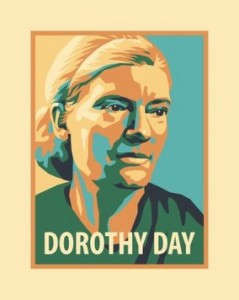 There are some among the Christian faithful who would prefer not to spend resources, personal and financial, on the sainthood investigation of the Servant of God Dorothy Day. As we know the US bishops have recently given their approval for the process to move forward. The for Day’s cause for canonization is being promoted by the Archdiocese of New York; Cardinal Timothy Dolan is a very strong supporter, as is Cardinal Francis George among others.
There are some among the Christian faithful who would prefer not to spend resources, personal and financial, on the sainthood investigation of the Servant of God Dorothy Day. As we know the US bishops have recently given their approval for the process to move forward. The for Day’s cause for canonization is being promoted by the Archdiocese of New York; Cardinal Timothy Dolan is a very strong supporter, as is Cardinal Francis George among others.I bear a burden of responsibility for publicizing that line, which I quoted in the introduction to an anthology of her writings almost thirty years ago. Where did it come from? I can’t honestly say. I do remember one time sitting at the kitchen table with her at St. Joseph’s house, looking at an issue of Time magazine in which she was included in a list of “living saints.” “When they call you a saint,” she said, “it means basically that you are not to be taken seriously.”
Whatever the provenance of her famous “quote”–the important question is: What did she mean?
Dorothy’s own relationship with saints was anything but cynical. Both her daily speech and her writings were filled with references to St. Paul, St. Augustine, St. Francis of Assisi, and St. Teresa of Avila. She treasured their stories. For Dorothy these were not idealized super-humans, but her constant companions and daily guides in the imitation of Christ. She relished the human details of their struggles to be faithful, realizing full well that in their own time they were often regarded as eccentrics or dangerous troublemakers.
But she didn’t just study their life and writings. She also firmly believed in their role as heavenly patrons. Whenever funds or provisions ran low she would “petition” St. Joseph. She would pray to St. Therese for patience and understanding. She would pray to St. Francis to increase her spirit of poverty. For many years, the Catholic Worker was largely illustrated by woodcuts by Ade Bethune depicting the saints in everyday dress, performing the works of mercy. She devoted many years of her life writing a life of St. Therese of Lisieux. I have no doubt she would have delighted in the news that St. Therese was named a Doctor of the Church. It is unthinkable that she would have responded by saying, “That means basically that Therese is not to be taken seriously!”
Furthermore, long before Vatican II took up the theme of the universal call to holiness, Dorothy Day taught that “we are all called to be saints.” As she noted, “We might as well get over our bourgeois fear of the name. We might also get used to recognizing the fact that there is some of the saint in all of us. Inasmuch as we are growing, putting off the old man and putting on Christ, there is some of the saint, the holy, the divine right there.” In other words, Dorothy Day regarded sanctity as the ordinary vocation of every Christian–not just the goal of a chosen few.
What Dorothy certainly opposed–and what saint wouldn’t?–was being put on a pedestal, fitted to some pre-fab conception of holiness that would strip her of her humanity and, at the same time, dismiss the radical challenge of the gospel. “Dorothy Day could do such things (live in poverty, feed the hungry, go to jail for the cause of peace). She’s a saint.” For those who said this sort of thing, the implication was that such actions–which would be out of reach for ordinary folk–must have come easily for her. She had no patience for that kind of cop-out.





